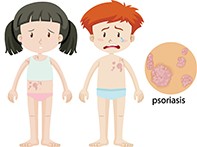Frequently asked questions about psoriasis
This handout provides some information about psoriasis in children
Q. What is psoriasis?
A. Psoriasis is a very common inherited condition where areas of the skin look red and scaly and are often itchy. It is a skin condition, and although in adults it may be associated with arthritis, this is very rare in children.
Q. Can other people catch psoriasis from my child?
A. No, psoriasis is not an infectious disease. It cannot be caught, it is not cancer, and it is rarely dangerous. However, children can inherit from their parents the genetic tendency to have psoriasis.
Q. Is there a cure for psoriasis?
A. At present there is no cure for psoriasis, and beware anyone who claims to have one. This is because we still don’t have any way to alter our genetics. However, we know a great deal more about this than we did 10 years ago.
Q. Is psoriasis caused by something in my child’s diet?
A. We don’t believe that diet has any effect on psoriasis. This is a medical point of view, and natural therapists will disagree. However, eating a healthy diet improves your child’s general health, and this is always good for psoriasis.
Q. What will make psoriasis worse?
A. Stress, illness, lack of sleep and injury, especially to your child’s skin, may make psoriasis worse. Infection with a type of bacteria called Streptococcus, which causes tonsillitis, will also often result in the psoriasis getting worse.
Q. What treatment is available?
A. Psoriasis in your child can be controlled with a bit of time and effort from you and help from your doctor; however, you have to be committed. There are many ways to treat the psoriasis. It often takes at least six weeks of treatment to achieve a good result. Remember, everyone is different and an individual treatment needs to be prescribed for your child. Your doctor will recommend the best and safest treatment. MT
This MedicineToday handout is provided only for general information purposes. The information may not apply to everyone and the handout is not a substitute for professional medical care and advice. Please discuss the information with your doctor.


